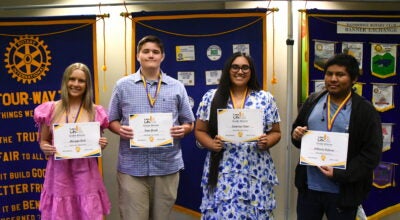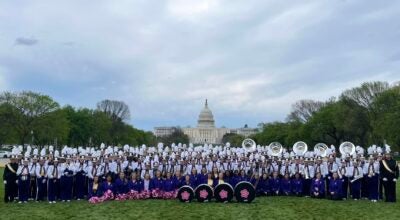How locals are serving Uganda
Published 9:30 pm Friday, March 28, 2014
Climax native Stanley Phillips, who pastured Fellowship Baptist Church on Spring Creek Road for 14 years, never dreamed he would be doing God’s work in Uganda.
When he left Fellowship he decided to go into evangelism and travel, but what he had in mind was helping out small churches in the southeastern United States.
While he served First Baptist Church in Colquitt for a few years he helped rebuild some run-down churches, but “I never planned to be out of the states,” he says. Yet God had other plans.
Phillips became involved with a Zebulon, Ga. organization called Pennies for Posho, which has been taking food to Africa for 15 years. In 2013 Phillips was asked by Pennies for Posho to put together a team to take food to 15 orphanages in Uganda.
He and his daughter Macy, as pre-med student at University of Georgia, and his sister-in-law Lynn Phillips, an RN who works for Archbold Hospital, were part of the group that visited 15 orphanages. They were able to feed 5500 children with one meal a day.
On the last day of their trip Phillips stayed behind at one of the orphanages to install solar panels on a building, while his daughter traveled with the group to the last orphanage at Budiba, located near the border of Kenya. She came back and told her father, “Dad, we need to do something about Budiba.” She reported she had seen the worst conditions ever there. Children were sick and in rags. He told her that they were there to deliver food, and that they couldn’t do everything. She responded, “Dad, you put God in a box.”
He said this was further brought home to him on the plane ride home when he met Robert Womack who had also made the Budiba trip and found himself convicted by God to do something to help.
Phillips and Womack stayed in touch and Phillips agreed that the Words of Truth Teaching Ministries, a 501-C-3 organization with which he is involved, would take on Budiba as a ministry.
He sent Womack back to Uganda to determine the most pressing needs, thinking that they should first build some good barracks for the orphans who were sleeping on the wet ground in mud huts.
Once Womack did his assessment, he called Phillips to tell him the most critical need was for medical care, that all 300 children appeared to be seriously ill and the well they had was contaminated. After taking care of the well problem, Phillips began assembling a team of medical volunteers to go care for the children.
“I didn’t want to go to Uganda, but I went, and on the plane ride home I said I would never go back,” admits Phillips. Yet, on March 7, 2014 he found himself once again on the plane along with a medical team comprised of five registered nurses, one pharmacist, five pre-medical students from UGA, a pastor from Lake Seminole Baptist Church and Johnnie Payne, Director of Music from The Friendship House. They took with them 22 40-pound totes full of medical supplies.
Phillips said it is always a challenge to take any supplies into the country because of the corrupt officials. When they arrived at the airport at Entebbe customs began going through all the totes. Phillips said he knew if they found the drugs they would confiscate them to sell. He had packed them in the last five special tubs. By the time customs went through all the preceding tubs they quit looking and asked, “What will you pay me to go on through?” He said he paid them $50. This is something they encountered everywhere.
The group rented a house in the town of Jinja, which was a three-hour bus drive to Budiba each day. They had to travel through police checkpoints each day, where again they were asked for bribes to let them pass.
The group was joined by a Ugandan physician and three other nurses. When they arrived at the orphanage they began drawing blood from the children to test for HIV, malaria and tuberculosis. Of the 270 children tested they found 90 percent had malaria. Only two tested positive for HIV. This is somewhat surprising since one reason there are so many orphans is because one or both of their parents has died of Aids. The children were immediately started on antibiotics.
Another big problem was the infestation of small parasites called jiggers, which invade the children’s feet, as all go barefoot. They lay their eggs inside the skin and they eat away at the flesh. The medical team cut jiggers out of 87 children, and treated the sores, some of which had turned to gangrene.
The mission group also bought shoes for all the children through a group called Sole Hope. “Our local youth in Southwest Georgia raised the $3000 to pay for the shoes,” added Phillips.
Phillips admits he has now let God out of the box, as two more trips are planned, one for July and one in October.
“Our goal now is to deal with the malaria by starting in July to build dorms and nine school rooms. That will be a challenge, as there is no infrastructure—no electricity, and all materials will have to be brought in from Kenya.” Bunk beds are now being made in Jinja and all will be outfitted with mosquito netting.
“Our end objective is to buy land next to the orphanage. We want to take a group of Decatur County farmers there to teach them how to grow food.” Phillips said they have very fertile soil and plenty of rain in this particular region, yet they are starving.
“The problem with missions work through the years has been giving food instead of teaching them how to grow their own in order to become self-sufficient,” he explained.
Phillips invites anyone in the medical or construction field who feels called to go help to visit www.wordsoftruthteachingministries and complete an application. The organization will contact interested parties and advise them what is needed. This includes a series of shots and vaccinations.
“Everything we have been able to do so far has been like a miracle. God through the people of Colquitt, Cairo, Climax and Bainbridge, has supplied everything we needed.”
Phillips said they also spent three days teaching local pastors the basic teachings of the Bible. Many of the pastors walked as far as 80 miles to hear the teachings. This was accomplished through an interpreter.
Phillips added that many churches have been doing good work in the African nations for many years. As a result, the children are all being taught to speak English. They also have English names as well as their native ones.
For those who would like to help, but have no desire to travel to Uganda, Daisy Joan Ministries offers handmade Ugandan items for sale at Polka Dots on the Square in Bainbridge.
These items include straw bags, beads, nesting baskets and headbands. This project was conceived by Macy Phillips, who named it after a little girl she met at one of the orphanages. All proceeds from these sales go back to Uganda to help provide income to the people there.





